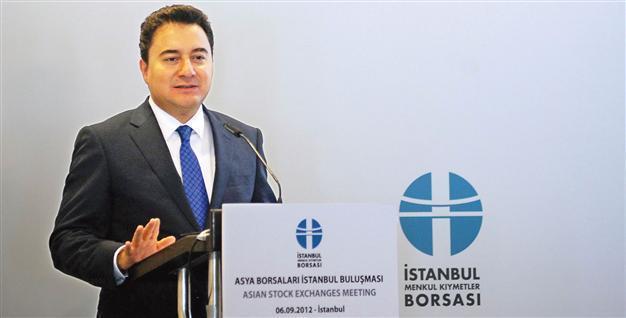Babacan says G-20 is superceding G-7
ISTANBUL - Anatolia News Agency

Deputy Prime Minister Babacan says that developing countries, which are part of the Group of 20 (G-20), are having a stronger presence in the global economy.
The G-20 (Group of 20) has become a more effective mechanism than the G-7 (Group of 7), Deputy Prime Minister Ali Babacan has said.Speaking at the “Asian Stock Exchanges Istanbul Meeting,” hosted by the head of the Istanbul Stock Exchange, İbrahim Turhan, Babacan said: “The G-7 mechanism used to be very effective, but now we see that the G-20 is quickly overtaking the G-7. When the G-7 comes together, they no longer have that old representative power. However, when the 20 countries sit at the table, you can see a very effective decision-making mechanism,” he said.
In fact, Babacan’s comments come just as the OECD pulled down its growth forecast for the G-7 this year to 1.4 percent and its growth target for the U.S. from 2.4 percent to 2.3 percent.
Collectively, the G-20 economies account for more than 80 percent of the world’s gross product.
The largest emerging economies of today, including Turkey, will surpass in size by the G-7 nations in about two decades, PricewaterhouseCoopers claims.
Weight shifting to East
Babacan said developing countries are starting to have a stronger presence in the world economy and are playing a more active role in global economic and financial management. According to Babacan, the world’s economic weight is beginning to shift from the West to the East and from developed countries to the developing world, and the 2008-2009 financial crisis solidified this trend. The developing world, which used to have only a 23 percent stake in the global economy, has now raised this figure to 47 percent today. He said that when one looks at the world’s top ten economies, countries like China, India, Brazil and Russia are higher on the list than England, France and Canada.
“Even if the dominance of developed countries is continuing, capital investments by developing countries are rapidly on the rise. No longer are developing countries relating to one another by the systems set up by developed countries,” he added.
‘BOURSES LOSE INFLUENCE’
ISTANBUL – Anatolia News Agency
Bourses are losing clout, which is a global problem, Capital Markets Board (SPK) head Vedat Akgiray said at a meeting organized by the Istanbul Stock Exchange (İMKB). “But I think we may overcome this challenge,” he said. “We have to make investors trust the bourses.” İMKB head İbrahim Turhan suggested that local bourses should develop joint projects. “In the last 20 years there have been consolidations in world capital markets, which have challenged bourses in developing countries in terms of technological infrastructure and liquidity funds.”
















